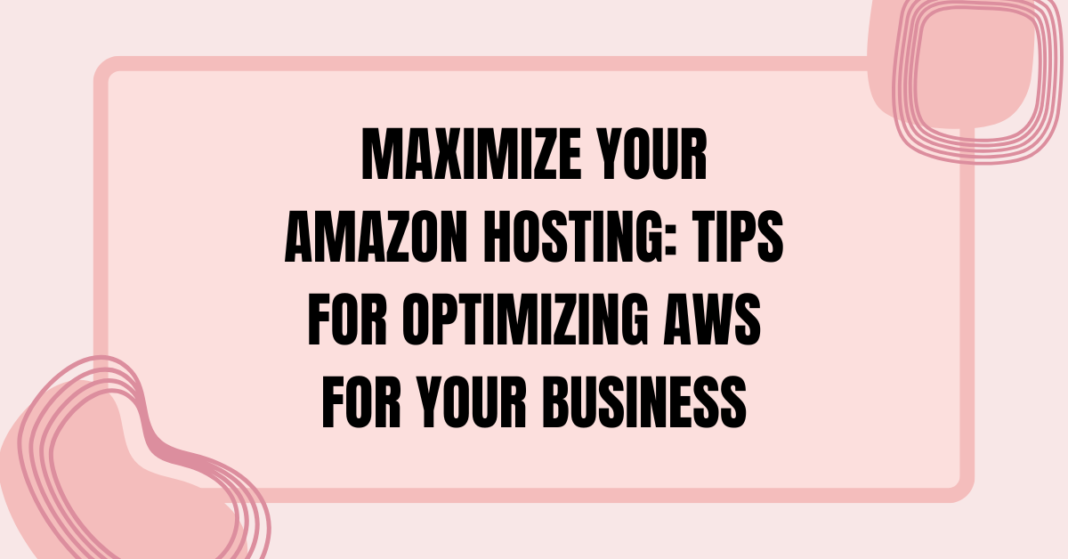Are You Getting the Most Out of Your Amazon Hosting?
In today’s digital landscape, hosting is the backbone of any online venture, whether it’s a personal blog, an e-commerce website, or a large-scale enterprise application. Among the vast options for hosting services, Amazon Web Services (AWS) stands out as one of the most powerful and versatile platforms available. As businesses of all sizes look for reliable and scalable hosting solutions, AWS offers a compelling range of services that cater to diverse needs. However, simply using AWS isn’t enough — to truly maximize its potential, it’s essential to understand the full scope of what Amazon hosting offers and how to optimize it for your business.
What is Amazon Hosting?
Amazon Hosting, more commonly known as Amazon Web Services (AWS), is a comprehensive cloud computing platform designed to provide businesses with the tools and infrastructure they need to host and scale applications, websites, and services. AWS is part of Amazon’s broader portfolio and offers a range of hosting services, including virtual servers, storage solutions, databases, content delivery networks, and more. Unlike traditional hosting, which requires businesses to maintain their own physical servers, AWS offers cloud-based hosting solutions that are scalable, secure, and reliable.
Some of the most well-known AWS services include:
- EC2 (Elastic Compute Cloud) for scalable computing power,
- S3 (Simple Storage Service) for data storage and file management,
- RDS (Relational Database Service) for managed database hosting,
- Lightsail, which offers simplified hosting options for developers,
- CloudFront for fast content delivery via a global CDN, and
- Route 53 for DNS management.
These services are designed to cater to different types of businesses, from small startups to large enterprises, offering flexible and scalable solutions for all hosting needs.
The Advantages of Amazon Hosting
One of the biggest draws of Amazon hosting is its ability to offer flexibility and scalability, making it suitable for businesses at any stage of growth. Whether you’re just starting with a simple website or scaling to handle millions of users, AWS can accommodate your needs. But that’s just the beginning. Let’s take a closer look at some of the benefits Amazon hosting offers to its users.
Scalability to Meet Growing Demands
Perhaps the most significant advantage of Amazon hosting is its unparalleled scalability. In traditional hosting, businesses are often limited by the capacity of their physical servers. As your website or application grows, so do your resource requirements, and it can be challenging to predict exactly how much infrastructure you’ll need in the future. With AWS, you only pay for what you use, and the platform allows you to quickly scale your resources up or down depending on demand. This flexibility is invaluable for businesses that experience fluctuations in traffic, such as e-commerce sites during holiday seasons or startups that are growing quickly.
For example, Amazon EC2 allows you to launch instances with varying computing power, and Auto Scaling automatically adjusts the number of instances based on traffic patterns. This level of elasticity ensures that your application always has the resources it needs, without overprovisioning and paying for unused capacity.
Cost Efficiency
Amazon hosting is often more cost-effective than traditional hosting models. AWS operates on a pay-as-you-go basis, meaning you are billed only for the resources you consume. This is a huge benefit for businesses, as it removes the need for large upfront investments in hardware. AWS also offers a free tier for new users, allowing them to experiment with various services at no charge. This makes it especially appealing for startups and developers who want to test the waters of cloud hosting without the burden of high costs.
With AWS, you can save costs by scaling resources only when necessary. For example, if your website experiences a sudden spike in traffic, you can increase server capacity temporarily and then reduce it once traffic subsides. This pay-per-use pricing model allows businesses to adjust their expenses based on actual needs, rather than paying a fixed amount regardless of usage.
Reliability and Performance
When it comes to hosting, reliability is critical. Any downtime can lead to lost customers, decreased revenue, and a damaged reputation. AWS boasts an impressive 99.99% uptime guarantee, meaning your services are highly available and will experience minimal downtime. This level of reliability is a major selling point for businesses that cannot afford to be offline.
Additionally, AWS operates a global network of data centers, meaning your content can be distributed closer to users around the world, improving speed and latency. With services like Amazon CloudFront, you can use AWS’s Content Delivery Network (CDN) to cache content closer to end-users, resulting in faster load times and a better user experience.
Advanced Security Features
Security is another strong suit of Amazon hosting. AWS implements a multi-layered security approach to protect both your data and applications. All data is encrypted, both in transit and at rest, ensuring that sensitive information is always protected. AWS also provides extensive tools for managing user permissions and access through Identity and Access Management (IAM), allowing businesses to control who can access specific resources.
For businesses in highly regulated industries, AWS is also compliant with a wide range of industry standards, such as HIPAA, GDPR, SOC 2, and ISO 27001, making it an excellent choice for enterprises that require strict security and compliance measures.
Getting the Most Out of Amazon Hosting
To truly benefit from Amazon hosting, it’s important to fully leverage its features and best practices. Here are some ways you can maximize your use of AWS and ensure that your hosting solution is both efficient and cost-effective.
Choose the Right Service for Your Needs
AWS provides a wide array of services, but choosing the right ones for your specific use case is crucial. For small projects or businesses, AWS Lightsail offers a simplified, cost-effective hosting option that is easy to manage. For more complex applications, EC2 offers greater flexibility and scalability, allowing you to fine-tune your infrastructure as your business grows. If you need storage, S3 is a reliable and scalable option for storing large amounts of data. By selecting the right services, you can ensure that your AWS setup is optimized for your needs and avoid unnecessary costs.
Implement Auto Scaling
One of the most valuable features of AWS is its ability to scale resources automatically. With Auto Scaling, your hosting resources are adjusted in real-time based on traffic demands. This ensures that your website or application runs smoothly during peak times while minimizing resource usage during quieter periods. Auto Scaling helps prevent overpaying for unused capacity while also ensuring optimal performance during high-demand situations.
Optimize for Performance
AWS offers numerous tools to help improve the performance of your application. For example, Amazon CloudFront helps deliver content faster by caching it at edge locations, reducing load times for users around the world. Additionally, by optimizing database queries and leveraging Amazon RDS, you can ensure that your application performs well under heavy traffic without compromising on speed.
Monitor Your Resources
AWS offers several monitoring tools, such as Amazon CloudWatch, to help you track resource utilization and set up alarms for usage thresholds. By actively monitoring your AWS environment, you can identify potential performance issues or cost inefficiencies and take action before they become problems. Regular monitoring helps ensure that your AWS hosting is running efficiently and at optimal cost.
Take Advantage of AWS Support
For businesses that require expert assistance, AWS offers a range of support plans. These plans provide 24/7 access to AWS experts who can help with troubleshooting, best practices, and optimization tips. If you’re running a mission-critical application, investing in AWS support can save you time and money by addressing potential issues before they affect your operations.
Frequently Asked Questions (FAQs)
1. What is Amazon Web Services (AWS)?
Amazon Web Services (AWS) is a cloud computing platform that provides a wide range of hosting and infrastructure services, including virtual servers, storage solutions, and databases. It allows businesses to run applications and websites in the cloud without the need for physical servers.
2. How does Amazon Hosting work?
Amazon Hosting works by providing businesses with access to AWS’s cloud infrastructure. Customers can choose from a variety of services, such as EC2 for computing, S3 for storage, and RDS for databases, to build and scale their applications. AWS operates on a pay-as-you-go model, where you only pay for the resources you use.
3. Is Amazon Hosting suitable for small businesses?
Yes, AWS is highly scalable and cost-effective, making it ideal for small businesses. Services like AWS Lightsail are specifically designed for simpler hosting needs and offer easy-to-manage solutions with a low cost of entry.
4. What are the security features of Amazon Hosting?
Amazon Web Services offers multiple layers of security, including encryption, identity and access management (IAM), firewalls, and compliance with industry standards such as GDPR and HIPAA. AWS’s robust security features help protect your data and applications.
5. Can I migrate my existing website to Amazon Hosting?
Yes, AWS provides tools such as AWS Migration Hub and Server Migration Service to help businesses move their existing infrastructure to the cloud. The migration process can be streamlined with these services, ensuring a smooth transition.
Conclusion
Amazon Hosting offers a comprehensive, flexible, and cost-effective solution for businesses looking to scale and manage their web infrastructure. By choosing the right services, optimizing performance, and leveraging AWS’s scalability, security, and cost-efficiency, businesses can truly get the most out of their Amazon hosting experience. Whether you’re a small startup or a large enterprise, AWS provides the tools and features necessary to grow your business in the cloud. Amazon Book also offers a wide variety of educational and self-help books.




